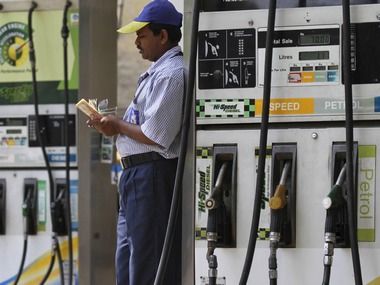Singapore: Brent crude fell further below $104 on Monday, paring earlier gains to stand at a near 7-week low, on concerns that euro zone policymakers were doing too little to stem a debt crisis that helped wipe as much as 9 percent off oil prices last week.
Reports that European leaders were seeking new ways to solve the crisis boosted commodity markets in early trade, but the rally fizzled out as investors sought more evidence of concrete action, analysts said.
“Absent some formal measures to deal with the debt problem, the general statements coming out of the euro zone are unlikely to reassure the markets,” said Ric Spooner, chief market analyst with CMC Markets in Sydney. “Until we get something more concrete, there will be limited upside for oil.”
[caption id=“attachment_92308” align=“alignleft” width=“380” caption=“Market participants had hoped for more concrete measures from a meeting of finance chiefs of the Group of 20 nations and the 187-country International Monetary Fund (IMF). Reuters”]  [/caption]
Brent futures traded 43 cents lower at $103.53 a barrel by 0425 GMT, after rising to as much as $104.70. The contract plunged 7.35 percent last week in its biggest such loss since May 6.
US crude dipped 40 cents to $79.45 a barrel, after rising more than a dollar earlier. It was down more than 9 percent last week. Gold lost more than 2 percent on Monday, after sliding a record $100 an ounce in the previous session, as safe haven seekers deserted the precious metal for the dollar and US Treasuries. Spot silver dived 9.5 percent to its lowest since early February.
The stronger greenback, which rose 0.23 percent against a basket of currencies, also weighed on oil prices, as it makes dollar-denominated assets more expensive when purchased in other currencies.
Brent oil will fall to $92.86 per barrel over the next three months, while US crude could fall to $64 per barrel by the end of 2011, according to Reuters market analyst Wang Tao.
IMF, G20
After a weekend of being told by the United States, China and other countries that they must get more aggressive in their crisis response, European officials focused on ways to beef up their existing 440-billion rescue fund.
But market participants had hoped for more concrete measures from a meeting of finance chiefs of the Group of 20 nations and the 187-country International Monetary Fund (IMF). “Commodities could come under further selling pressure today with nothing concrete announced over the weekend to lift the market,” ANZ Bank said in a research note.
Greece, the epicenter of the crisis, is trying to secure its latest wad of cash from international lenders including the IMF next month to avoid a default. The IMF said on Sunday its inspectors would probably return to Athens this week after getting written assurances on a new wave of austerity measures announced by Greece to resolve a debt crisis shaking the euro.
In the oil-producing Middle East, political unrest continues as Yemeni President Ali Abdullah Saleh made no pledge on Sunday to step down in his first address to the nation since returning home, calling for early elections in a move unlikely to appease protesters demanding his immediate departure.
In Libya, senior members of the country’s ruling National Transitional Council (NTC) are leaning towards putting on hold plans for a new caretaker government because they cannot agree on a line-up, a source close to the council told Reuters.
Reuters


)
)
)
)
)
)
)
)
)



